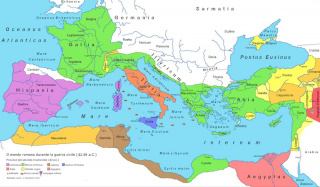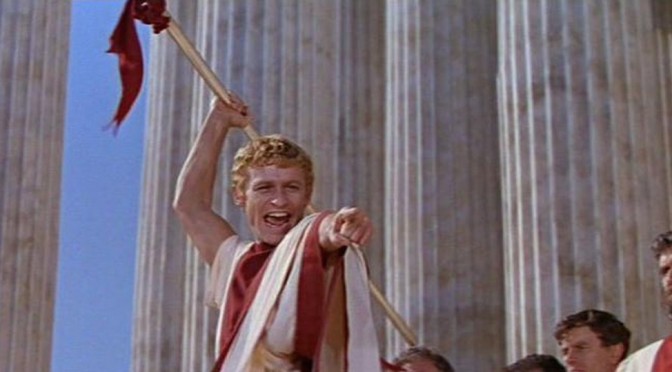 At the time of Caesar’s assassination Marcus Antonius was Caesar’s chief Military aide and consul for the year of 44.
At the time of Caesar’s assassination Marcus Antonius was Caesar’s chief Military aide and consul for the year of 44.
Of almost the same status as Antonius was Marcus Aemilius Ledidus who had succeeded Antonius as Caesar’s Master of Horse.
It was Antonius, however, who was able to take control of Caesar’s estates and disenfranchise Octavian, who had been nominated as Caesar’s heir.
Who was Octavian?
The obvious answer was that he was Julius Caesar’s great nephew,
However his mother Attia Balba Caesona claimed that he was the result of a virgin birth just as Olympias, mother of Alexander, had claimed.
Suetonius (remember these may not necessarily be his words) gives an account of Augustus’ conception which mentions the divine omens she experienced before and after his birth:
“When Atia had come in the middle of the night to the solemn service of Apollo, she had her litter set down in the temple and fell asleep, while the rest of the matrons also slept. On a sudden a serpent glided up to her and shortly went away. When she awoke, she purified herself, as if after the embraces of her husband, and at once there appeared on her body a mark in colours like a serpent, and she could never get rid of it; so that presently she ceased ever to go to the public baths. In the tenth month after that Augustus was born and was therefore regarded as the son of Apollo. Atia too, before she gave him birth, dreamed that her vitals were borne up to the stars and spread over the whole extent of land and sea, while Octavius dreamed that the sun rose from Atia’s womb.
The day he was born the conspiracy of Catiline was before the House, and Octavius came late because of his wife’s confinement; then Publius Nigidius, as everyone knows, learning the reason for his tardiness and being informed also of the hour of the birth, declared that the ruler of the world had been born”
For this we must read that Octavian’s real father was not Octavius, the father identified in conventional history”
Octavian was yet another Egyptian in Rome and despite being related to Caesar was a member of the Pompeyian faction. (His mother’s father was Pompey’s cousin)
After Caesars death, Octavian arrived in Rome from Greece relatively late on the scene and reached an uneasy truce with the senate and Mark Anthony.
Conventional history says that Octavian managed to obtain majority support from the senate.
It continues that Antonius found himself outmanoeuvred and accepted the Governorship of Gaul as a bribe to get him away from Rome. In Gaul the existing Governor refused to give way to him and again managed to obtain the senate’s support. The senate did not have an army and Octavian managed to persuade them that his army, soldiers loyal to Caesar, could bring Antonius under control.
What happened is that after a brief conflict, a peace conference at Bologna divided the Empire into three parts.
In fact the agreement split the empire into four parts as there was an agreement that Sicily, Corsica and Sardinia would remain under the control of Sextus Pompeius Magnus Pius, son of Pompey.
The stated reasoning for allowing Pompeius control of the Mediterranean islands was that there was a need to mobilise the maximum strength of legions for the planned expansion into Parthia.
In fact the legions were never sent east.
Conventional history says that both Lepidus and Antonius sent ships and troops to help Octavian defeat Sextus but Octavian then dismissed Lepidus and refused to help Antonius.
Octavian proceeded to antagonise a large part of the Italian peninsula by confiscating land and allocating it to Legionaires. It was as if he was tempting Antonius to attack him. Almost certainly he was.
It was only by presenting the senate with a greater threat than himself that he would be able to promote himself as Emperor.
The question is was their really conflict and competition between Octavian and Anthony or was this just an extension of the Egyption conspiracy?
Was it all staged managed?
Was it still part of the struggle amongst the Pompeyian and Sullyian factions?
Did Anthony play a part to facilitate the transformation of Rome from a Republic to a Dictatorship?
